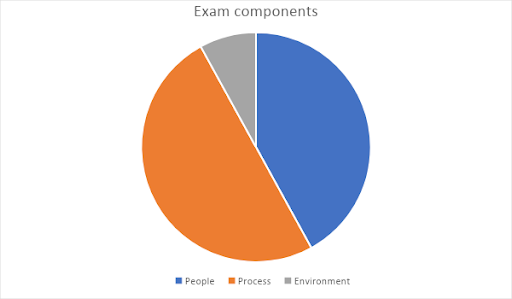
5 advantages of a PMP certification over an MBA or Masters in 2025
Whether you already have a career as a project manager or are a fresh graduate looking for the next step, you’ll likely consider further studies. When it comes to project management, the direction you choose will significantly affect your career opportunities and choices. For many prospective project managers, the allure of an MBA or a masters in project management seems to be attractive, but what is the difference and are they worth it?
The route to becoming a certified project manager can be daunting and often at times very challenging. Ultimately, if you want to be the best project manager you can be and open as many doors of opportunity as possible, you’ll need to obtain the PMP certification.
There is a significant and important difference between a masters in project management, an MBA in project management and the PMP certification.
Let’s look at the differences in more detail:
What is the difference between the PMP, Masters and an MBA in project management?
The most important aspect to consider between the three qualifications is that an MBA and a masters in project management are academic qualifications which you obtain from a tertiary institution such as a university or business school. On the other hand, the PMP certification is a professional certification of competence which is governed by the Project management Institute (PMI). The PMP certificate indicates to employers that you indeed understand all the ins-and-outs of project management. It consists of external exams and compulsory work experience.
An MBA or a masters in project management on the other hand are academic qualifications. These are governed by educational institutions and do not need to comply with requirements as set out by the PMI. Although these qualifications may help you understand the theoretical part of project management en route to the PMP certificate, it doesn’t dictate that you are a certified project manager.
In order to be a certified project manager, you’ll need to obtain the PMP certificate from the PMI. To find out more about the PMP certificate, read more on how to become a certified project manager.
What is a masters in project management?
Once you have completed your undergraduate studies, you might consider a postgraduate qualification. If you studied toward a degree in project management, a masters in the field seems like a good idea. So what is it and what benefits does it have?
Studying a masters in project management will give you an added edge when applying for jobs. One big benefit is that you’ll likely be accepted in almost any industry and will have a thriving career and plenty of growth opportunities. One aspect of a masters in project management that you’ll need to consider is that it is purely an academic qualification and will probably only cover the theoretical part of project management. The project management industry is a hugely practical industry and being able to show proof of work done is rather important – especially if you do not have the PMP certificate yet.
There are many project management programs to choose from, and postgraduate options at both in-person and online educational institutions are plentiful. If you are already working or have a busy daily schedule, an online project management masters is a good choice. It allows for flexible study-time, you may be able to do the masters over 3 years instead of 2, or simply enjoy the work-from-home arrangement and complete your masters in the comfort of your own home.
What is an MBA in project management?
Initially an MBA was a sought after degree because not many people could afford the cost or to spend two years on a degree-programme during their working career. Nowadays there are hundreds of universities and business schools that offer MBAs in a variety of specialisations – including project management driven MBAs.
The initial high demand for MBA graduates drove educational institutions to shorten MBA programmes and make them more accessible to a larger audience – but this resulted in an influx of MBA students and practically anyone who could qualify and afford one, enrolled for one. This resulted in an over-supply of MBA graduates and thus the qualification lost its flare and attractiveness.
In the project management industry, it is important to recognise that even if someone completed an MBA, their careers often remained stagnant. And this is because an MBA in project management is an academic qualification. To maximise opportunity in the project management industry, an MBA can be beneficial, but ultimately you will want to complete the PMP certificate.
An MBA in project management provides you with the skills and knowledge to enter administrative roles. In such a course you will learn about accounting, finance, human resources, strategic planning and business operations – after all, it’s a Master of Business Administration in project management.
What you need to bear in mind is that an MBA in Project management does not make you a good project manager, or set you up for a career in project management. What it does do, is strengthen your qualifications that will enable you to take up managerial roles with regards to business administration in the project management industry.
So, which one should you study toward?
Let’s break down what we discussed to get the gist of the three qualifications:
PMP Certificate | Masters in Project Management | MBA in Project Management | |
Qualification type | Professional certificate | Academic qualification | Academic qualification |
Requires compulsory work experience | 4500 hours with a 4-year degree, 7500 hours otherwise | No | No |
Duration | About 2-3 months | 1-2 years | 1-2 years |
Theoretical understanding required | Yes | Yes | Yes |
Required for professional recognition as a project manager | Yes | No | No |
Available online | Yes | Yes | Yes |
5 advantages of the PMP over an MBA or masters in project management
Now that you understand the difference between the PMP certificate and a masters or MBA in project management, here are the five advantages of the PMP over an MBA in project management:
- The PMP certificate is widely recognised as the industry standard qualification and with this you’ll be a cut above the rest. Any other qualification such as a masters or MBA in project management will be regarded as additional to the PMP certificate. If you are serious about project management, the PMP certificate should be your main priority.
- If you didn’t go to university, you can still get the PMP certificate. All you need is 5 years work experience as a project manager and be able to show that you clocked in 7500 hours of work or more on projects (and yes, you’ll need to log your hours for five years and prove it to the PMI in order to be allowed to sit the examination).
- Instead of committing to two years of writing a thesis, writing exams or studying toward an MBA, you can spend that time gaining compulsory experience for the PMP.
- The PMP is significantly more affordable than full-time studies – and if you fail, you can attempt the exam multiple times at a fraction of the cost.
- MBA programs are designed to create managers. This means that holding an MBA in project management will still be a fairly general qualification and won’t be significantly focussed on the required knowledge and skills you need for project management. In this regard, the PMP has a big advantage over an MBA because you’ll be recognised as a project manager and not an MBA graduate.
PMP certification requirements
In order to qualify as a certified project manager, the PMP certificate is the most important qualification. Instead of leaving you in the dark, here is the route and options you can take on your journey.
- First, you’ll need 35 hours of project management training. The alternative to this is if you already hold a Certified Associate in Project Management (CAPM) certification, then you get an exemption.
- To obtain the CAPM certificate, you need a high-school diploma, associates degree or global equivalent and 23 hours of project management education. The CAPM application costs US$225 for members of the PMI or US$300 for non-members.
- 36 Months (4500 hours) of experience as a project manager if you hold a four-year degree OR 60 months (7500 hours) of experience if you only hold a high-school diploma or an associates degree.
- Apply and pay the PMP exam application fee. For PMI members, this is US$405, and for non-members US$555.
- Once approved, you’ll need to prepare for the exam by studying 2 – 4 months in advance.
- The PMP exam consists of 180 questions which you can complete online. You’ll write 60 questions in the first sitting, have a ten minute break, and write the other 120 questions. You’ll have a total of 230 minutes for the exam.
- The exam consists of three components: People (42%), Process (50%) and Business Environment (8%).
- If you fail, you are allowed to apply for two rewrites. US$275 for PMI members and US$375 for non-members. If you fail all three exam attempts, you are required to wait one year before being able to reapply.
- If you pass the exam, you need to maintain the qualification by earning 60 Professional Development Units (PDUs) – 35 educational and 25 from giving back to the profession in the form of published articles, training, seminars and work.

Wondering if you are ready to take the PMP certification? Why not refresh your knowledge and reskill with our Project Management Course.



